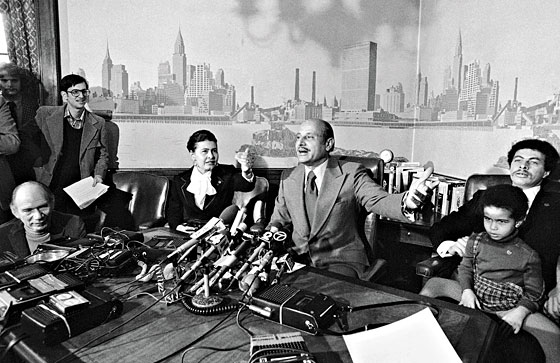
The eulogies of Percy Ellis Sutton delivered last week in Riverside Church sketched the long, multifarious life of one of Harlem’s titans. He was Malcolm X’s lawyer, a Manhattan borough president, radio entrepreneur, and guardian of the Apollo Theater. But he may be best remembered as the city’s architect of black power. The endurance of Sutton’s legacy, though, is harder to judge. Governor Paterson may be an acolyte of Sutton’s, if not an heir, but to Obama, he’s a nuisance to the Democratic Party.
Paterson is something worse in Albany—Kevin Parker, a black senator, was able to call him a “coke-snorting, staff-banging governor” with nary a rebuke. When Harlem Representative Charlie Rangel retires, the jockeying over his seat is unlikely to be settled smoothly by elders in a room but with a brass-knuckled free-for-all. In his eulogy, Al Sharpton underlined the urgency of the struggle. But the lack of racial edge in last year’s mayor’s race told a different story. The close contest was more a reflection of Bloomberg fatigue and economic grievances than black power.
The number of African-American elected officials has swelled, with 32 in the Legislature alone. But most lack a constituency beyond the reach of their pork and patronage. As do most of their colleagues. (The reviled Legislature is a great equalizer.)
In Sutton’s prime, the Harlem agenda cohered around the effort to challenge institutions—corporate, media, and political—that failed to represent black interests. Rising from an era of anti-poverty programs and civil protest, Sutton and his generation understood how to make deals and open doors. On the wings of Jesse Jackson’s Rainbow Coalition, their influence culminated in the election of David Dinkins. The promise of a turning point yielded to a dispiriting decline, and a backlash in the form of Giuliani, from which Sutton’s gang never recovered.
Some blame the elders, who evolved from pioneers to gatekeepers, keeping Harlem in a vise of self-interest. They controlled the flow of anti-poverty funds, public land, and patronage; demanded obeisance; and stomped on any saplings of rivalry. “They didn’t really train a new group of leaders to take over,” says Wilbur Rich, a Wellesley political scientist who studied the Dinkins administration. “It was more of a cult of personality, and the transfer of charisma is very difficult.” The Sutton machine also hung on to a definition of black leadership that refused to break with the past, while a younger generation of stars emerged in other cities. “If Cory Booker had been living in New York, he wouldn’t have been mayor,” says Rich. He’d be trapped in “mazes of legitimacy.”
But the weakening of Sutton’s machine was also due to demographics. Greater Harlem doesn’t even have a black majority anymore. And the city has seen the political awakening of other immigrant populations. “The campaigns today are reflective of a much more diverse city where more groups are competing,” says Democratic consultant Hank Sheinkopf.
Does the possibility of a cohesive black agenda still exist in the city? “Probably not. And maybe there shouldn’t be,” says Carl McCall, the former state comptroller whose career was launched by Sutton. “We should promote our agenda by linking our aspirations to the aspirations of everybody else.” There may not be a new Percy Sutton, but maybe that’s not such a bad thing. Says Sheinkopf: “He proved that a proud man didn’t have to bend and could do extraordinary things. But his era is over because he did his job too well.”
Have good intel? Send tips to intel@nymag.com.